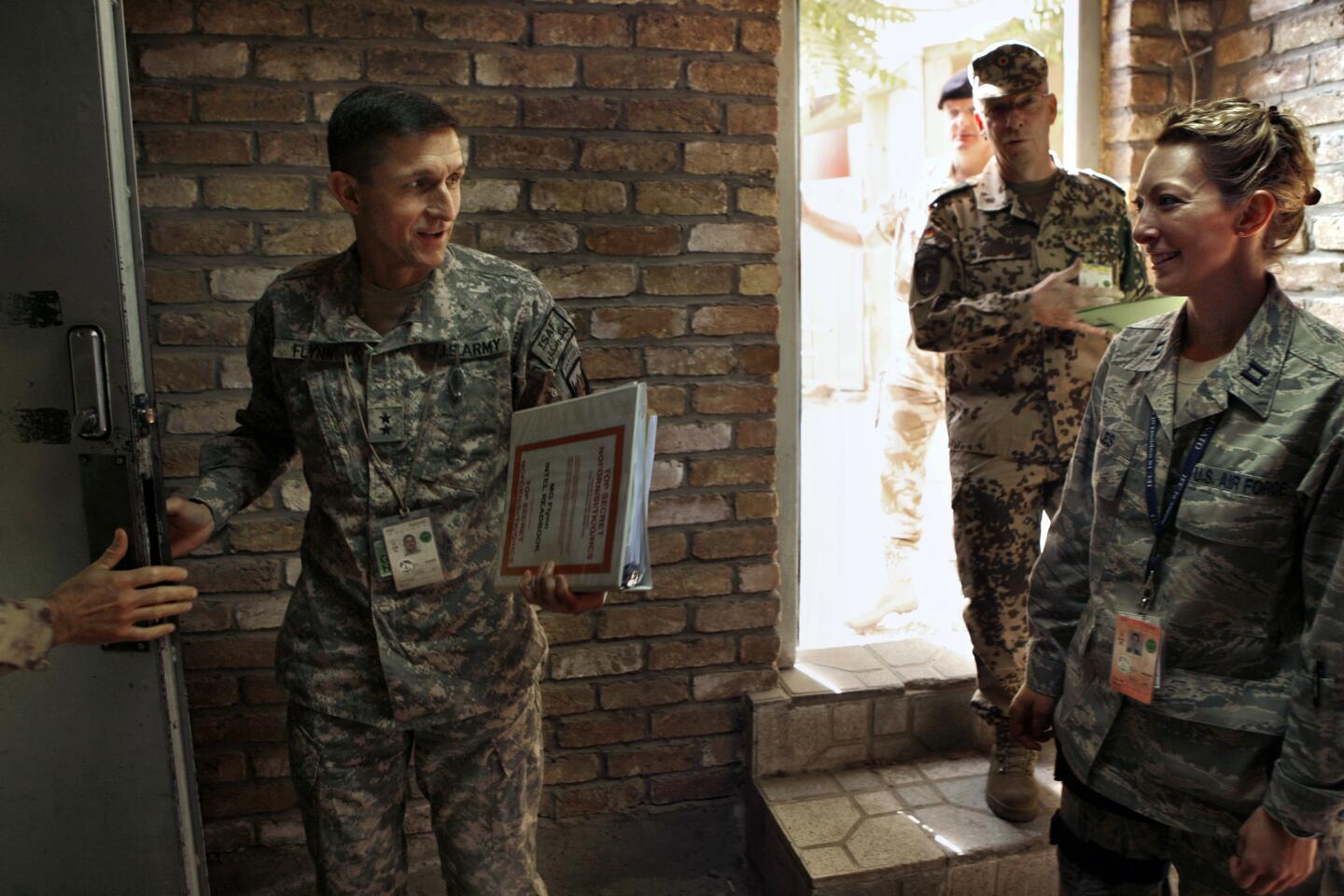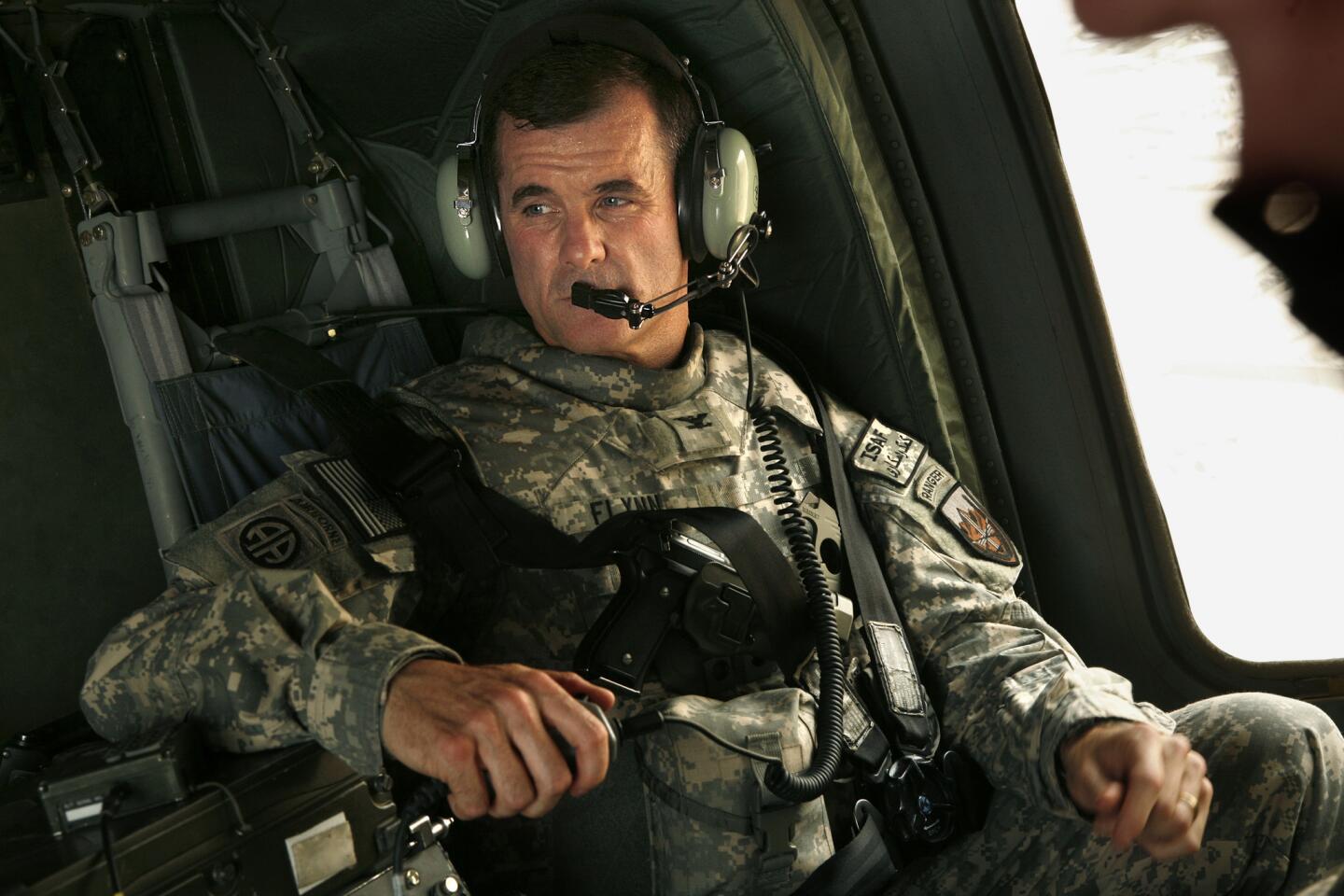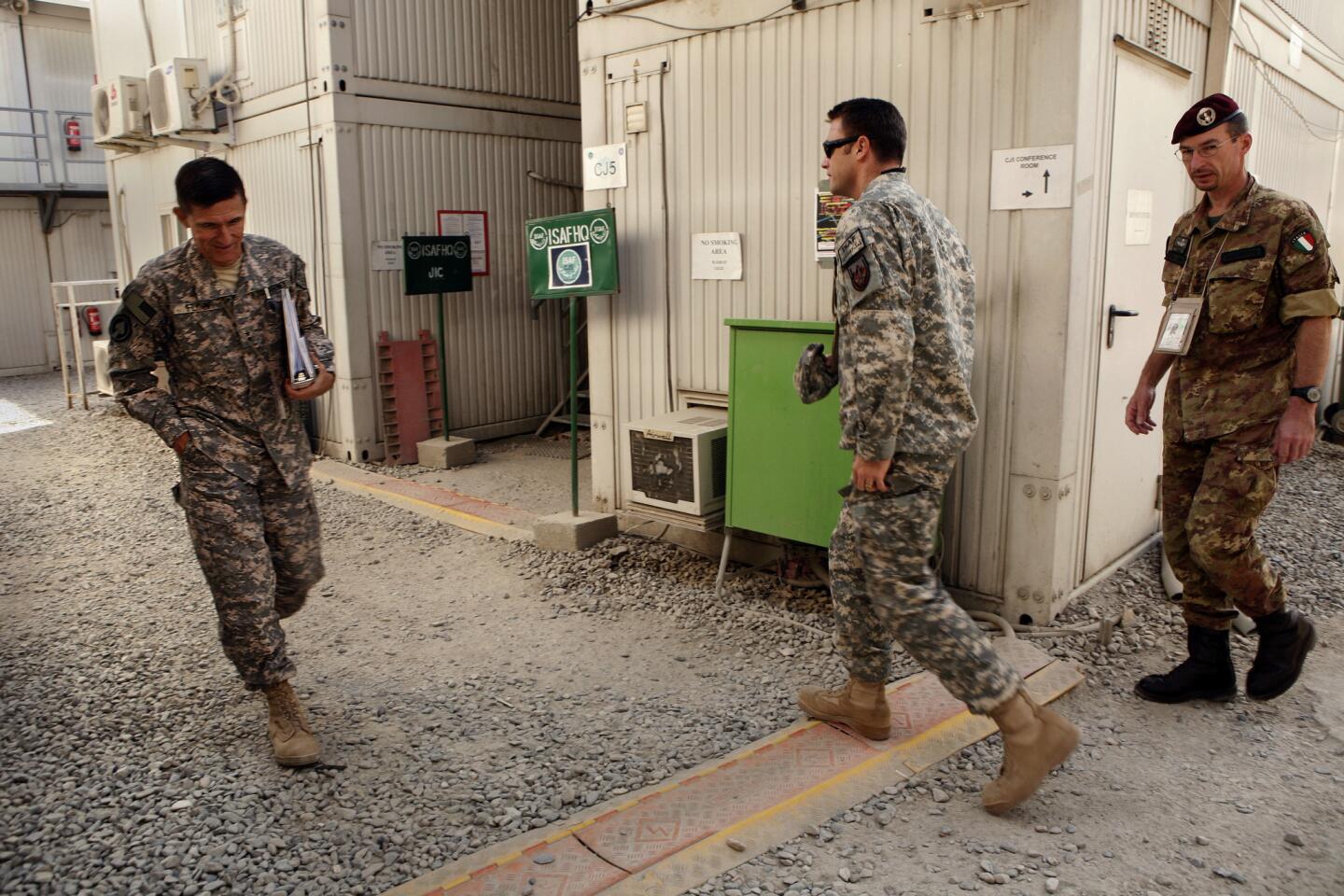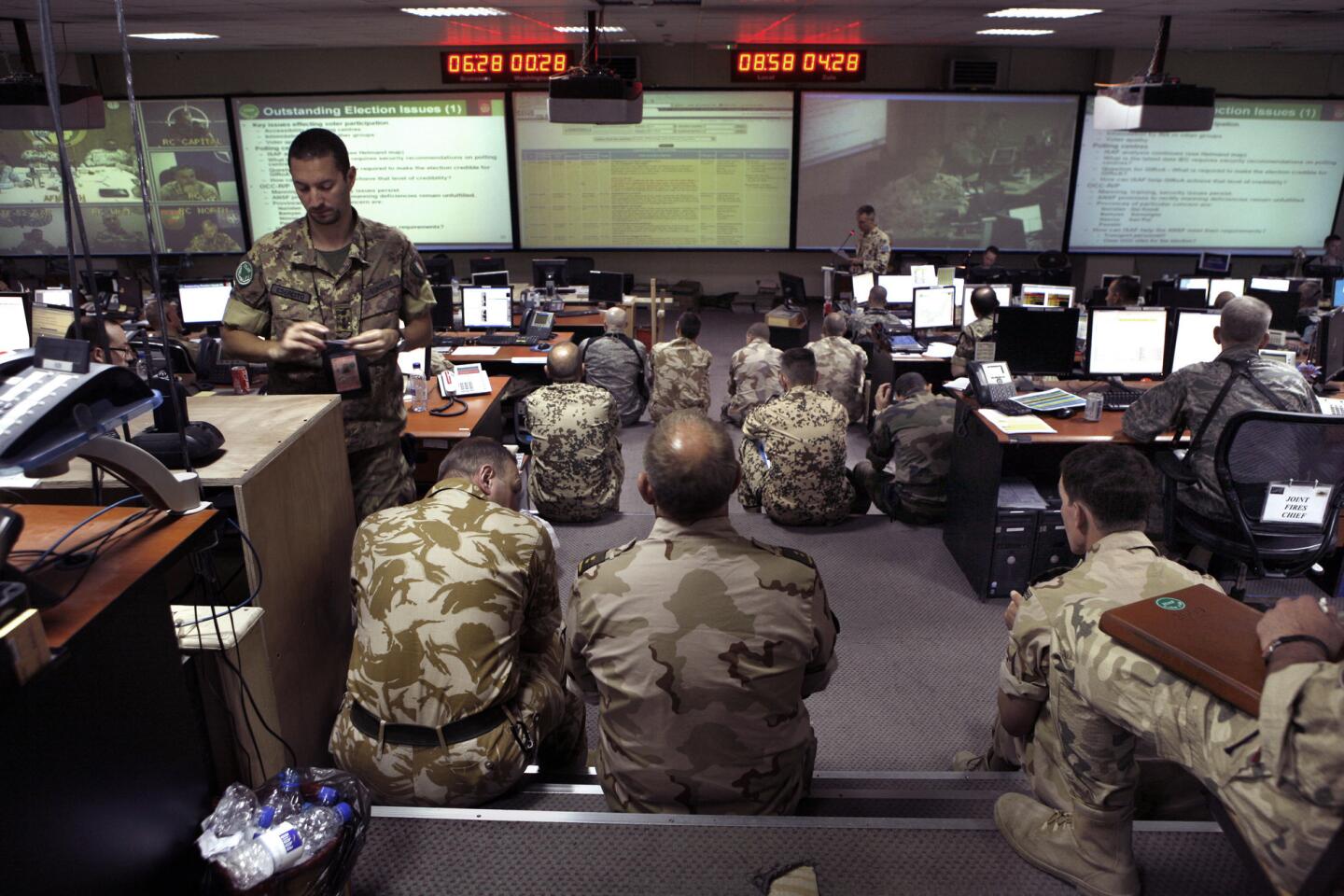From the Archives: U.S. intelligence chief in Afghanistan wages battle for resources
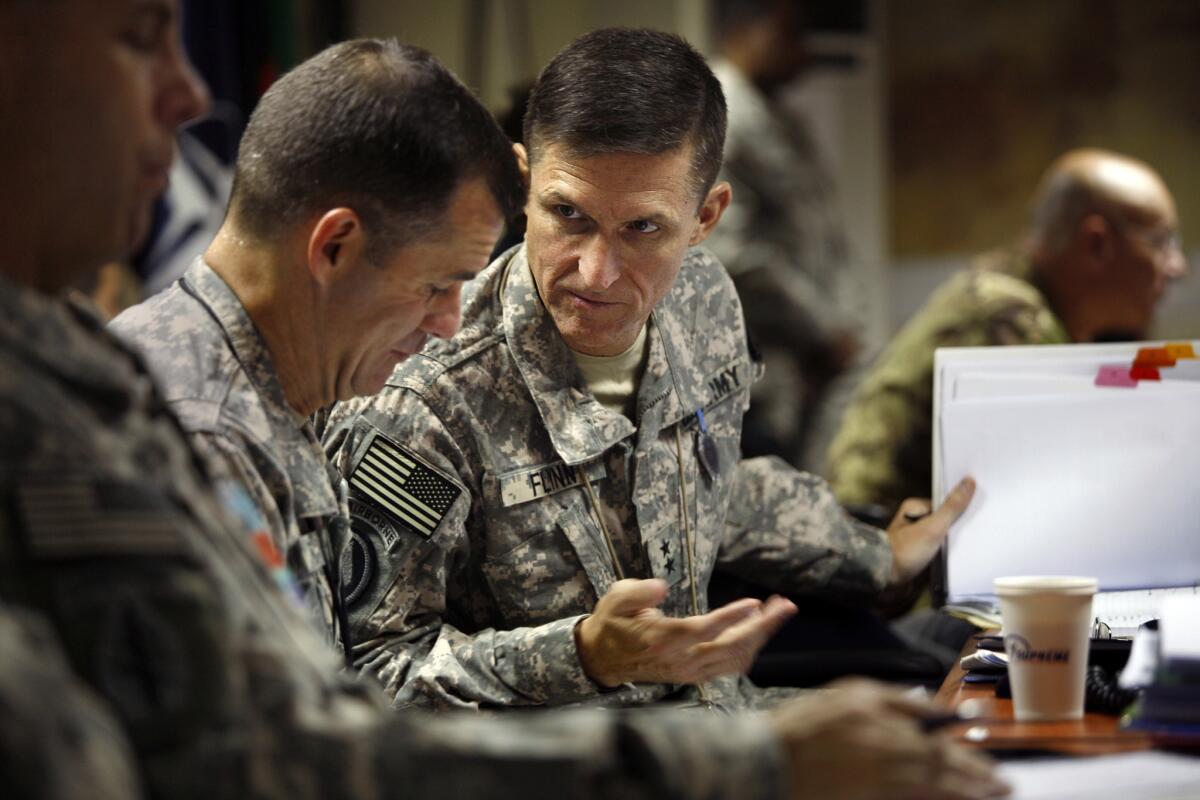
Maj. Gen. Michael T. Flynn, director of intelligence in Afghanistan, confers with his brother Col. Charlie Flynn, left, an aide to Gen. Stanley A. McChrystal, the U.S. and allied commander in Afghanistan.
- Share via
Reporting from Kabul, Afghanistan — The peaks of the Hindu Kush mountains create a stunning backdrop for the U.S. military’s Kabul headquarters, but Maj. Gen. Michael T. Flynn rarely notices. Sheltering Taliban fighters and American combat outposts, the mountains symbolize the old way of fighting. Flynn was sent here to help define a new strategy for the war.
In a teleconference center at the military complex, Flynn sat before a microphone, pressing his case for more Predator drones, intelligence analysts and satellites to peer beyond those peaks. An ocean away in the United States, a senior officer seemed to be dragging his heels, unwilling to reassign the assets.
Flynn knows the United States needs better intelligence to bolster its troubledeffort to defeat the Taliban in Afghanistan, but often he feels frustrated that others do not share his sense of urgency. He listened to the senior officer, peering incredulously over his glasses. He muted the microphone, then exploded, unleashing a torrent of profanity. “Come on guys, get your [expletive] together!” he yelled.
Flynn’s boss, Army Gen. Stanley A. McChrystal, the top U.S. and allied commander, has ordered an overhaul of how intelligence is collected, disseminated and, most of all, used by troops in Afghanistan.
McChrystal arrived in June, relatively unknown outside military circles. He has gained a high profile in the bruising policy debates of Washington, in part because of his request for more troops, on which President Obama is expected to announce a decision next week. Less visible are the commanders McChrystal has promoted to oversee the conflict.
Chief among them is Flynn, 50, a longtime McChrystal colleague who is charged with carrying out the commander’s vision of remaking a military establishment -- one that has historically admonished officers to “stay in your lane” -- into a more nimble and less hierarchical organization.
“He doesn’t stay in his lane,” McChrystal said of Flynn. “He never asks, ‘Why can’t we do this?’ He just busts down walls.”
A former top intelligence officer for the Joint Chiefs of Staff, Flynn knows well the importance of spy data and analysis. As McChrystal’s most important advisor, his influence extends much further. Among military officials in the Pentagon, he has become known as the “chief operating officer” of the Afghanistan war.
McChrystal has made protecting Afghan civilians the military’s top priority. According to military theory, the safer people feel, the less likely they are to support insurgents. As a result, learning about militant groups, in many cases, has become more important than destroying them.
Flynn believes the military needs a different approach to gathering intelligence about insurgents and their networks. When attacked, insurgents move, regroup and talk -- all information that can be collected and used to build a complete picture of the enemy.
Traditionally, commanders used intelligence to plan military operations.
“Now we do the opposite,” Flynn said. “We do the ops to get the intel.”
In meeting after meeting, Flynn cajoles, badgers and pesters fellow officers to get moving on initiatives such as sharing information with Afghan leaders and overhauling intelligence collection.
Flynn is known for subjecting subordinates to withering barrages of questions and demands. He pushes people to think beyond their narrow assignment and take greater responsibility. A military officer who served with the general on several assignments described the experience as “the Flynn roller-coaster. You had to strap in and ride it out.”
For the U.S. military, the change is unsettling and not altogether welcome. Some find it reassuring to know the limits of their responsibilities and duties. As Flynn tries to push through changes, testing those limits, a large military bureaucracy often is ready to push back.
In the secure video teleconference, the officer who must approve Flynn’s requests represented one such roadblock. When Flynn’s temper subsided, he flicked the microphone on once more and launched into something of a sermon.
“The problems we have are not insignificant,” he said in a voice that bears a New England accent. “The problems are not ones that have developed in the last 90 days. They have grown over the last nine years.”
To solve the problem will take creative thinking, Flynn said. But it is also going to require more resources -- quickly, he stressed.
“We have a shift in our major effort not because Gen. [David] Petraeus said so. And not because Secretary [Robert] Gates said so,” Flynn said. “But because the president of the United States has said so.”
Flynn prevailed. The command in Afghanistan received an initial increase in the number of Predators and other spy planes, including several reassigned from Iraq. Whether Flynn will get the rest of the intelligence assets he has requested will depend on Obama’s decision.
Flynn grew up in Newport, R.I., the son of a retired Army master sergeant. During his freshman year of high school, he started dating his future wife, Lori. (He notes that they broke up in the 10th and 11th grades and she turned him down for the junior prom.)After attending the University of Rhode Island on an ROTC scholarship, Flynn became an intelligence officer with the 82nd Airborne Division in Ft. Bragg, N.C. He participated in the Grenada invasion in 1983 and peacekeeping operations in Haiti in 1994.
Flynn and McChrystal first worked together in the early part of the Afghanistan war. McChrystal was the chief of staff to the U.S. military command and Flynn was the intelligence director.
The two have forged an unusually close relationship, one in which Flynn feels comfortable giving his boss unvarnished advice.
“As a personal friend, he is always looking out for you,” McChrystal said. “He is the guy who can say, ‘You are too tired, you are talking stupid, go to sleep.’ ”
Flynn is adept at reading a gesture, or a half-formed expression, and instantly knowing what McChrystal wants to do. “We have a connection. I just have this sense of what he is thinking about,” Flynn said.
His brother, Charlie, 46, met McChrystal first and is the commander’s executive officer and top aide. The new command team in Afghanistan projects an air of austerity, illustrated by McChrystal’s habit of eating only one meal a day. Even in that crowd, Michael Flynn’s lifelong tightfisted ways stand out.
Charlie Flynn, a colonel, jokes about the way his brother happily mooches drinks at bars and the car he had driven daily to work at the Pentagon.
Michael Flynn, who would park his 1986 Buick Park Avenue next to the Suburbans, Cadillacs and Lexuses in the generals’ lot, defended his car as a classic.
His brother was not impressed by the sagging springs of the car’s velour seats. “He looked like a gangster pulling out of the Pentagon,” Charlie Flynn said. “Gen. McChrystal says, ‘The only guy cheaper than me is Mike Flynn.’ ”
The sixth of nine children, Michael Flynn said that growing up with so many brothers and sisters made him value privacy and quiet time. And the experience of being a middle child instilled in him an ability to command attention when he needs to and to think unconventionally.
“I’ve always operated so far outside my lane, I’m not sure what lane is mine anymore,” Flynn said.
With his casual manner, Flynn projects a looseness uncharacteristic of Army intelligence officers. Intelligence experts, by and large, are trained to compartmentalize information, sharing it only with those who need to know. But in a series of top intelligence jobs, and now in Afghanistan, Flynn has worked to change the culture.
Robert Cardillo, a senior Defense Intelligence Agency official, said Flynn has long tried to get more people involved in sharing, analyzing and using intelligence.
Flynn’s methods create tensions with people who want information held tightly.
“What is most useful about Mike’s approach to problems was his unconventionality,” Cardillo said. “He would ask things in ways that intelligence officers weren’t raised to ask. What that would do is challenge the common wisdom.”
To institutionalize the sharing of intelligence in Afghanistan, Flynn is building new intelligence “fusion cells.” These centers are staffed and equipped to gather all available intelligence from video feeds, audio intercepts and other sources and make it available immediately to combat units across the country.
An even bigger hurdle for Flynn is improving how the allies share intelligence with the Afghan security forces. Earlier this year, Flynn proposed installing a secure video connection between the U.S. and Afghan military headquarters to allow officers to share intelligence and plan operations.
The project bumped up against North Atlantic Treaty Organization bureaucrats. In one meeting, Canadian and Polish officers, adeptly staying in their lanes, said Flynn’s plan faced serious problems: No money was budgeted for the equipment, installing it would violate NATO rules and there were not enough technicians for the job.
As the meeting dragged on, Flynn became exasperated. “This isn’t the Balkans and a peacekeeping mission,” he told them. “This is a combat zone.”
After the meeting, Flynn stopped the two officers in the gravel courtyard behind the NATO headquarters and tried to enlist them in his cause.
“We are going to move this command into the 21st century as fast as we can,” Flynn told them. “If you want to push back, push back. If what I am saying isn’t right, tell me. But from my experience, we can do this, and we can do it faster. Do not worry about perfect.”
When they seemed to be coming around, he pressed his point. “We are beyond the nonsense,” he said. “There is not a lot of time for us to show progress here in Afghanistan.”
A few days later, Afghanistan’s military command center got its top-secret communications equipment and a direct link to McChrystal’s war room in Kabul, the capital.
On a summer evening in Kabul, darkness had fallen as Flynn scurried through a maze of buildings to his destination, a meeting being run by McChrystal.
Halfway there, Flynn stopped. “I get this feeling of anxiety,” he said.
He fears that he will overlook an important issue or fail to prepare the commander for a crucial decision. “I can’t miss anything,” he said.
In front of the military headquarters, 42 flags representing the NATO countries and other nations contributing troops form a ring. It had been the deadliest fighting season for the alliance since the war began. On most other days, the 42 flags have been at half staff.
“The flags are at full mast,” Flynn said that night as he looked up. “It is a good day.”
Then he walked into the building and went back to work.
Times staff writer Greg Miller in Washington contributed to this report.
More to Read
Sign up for Essential California
The most important California stories and recommendations in your inbox every morning.
You may occasionally receive promotional content from the Los Angeles Times.

